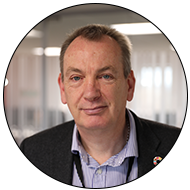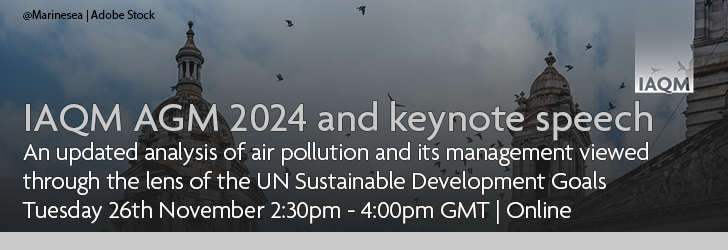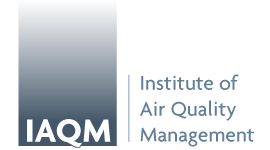Join us for the IAQM's 2024 virtual Annual General Meeting (AGM)! We will be announcing the results of the IAQM Committee election.
You will have the opportunity to hear about the IAQM’s strategic direction, activities over the past year, and welcome your new Committee members.
The AGM will be followed by a keynote speech from Professor Jim Longhurst.
An updated analysis of air pollution and its management viewed through the lens of the UN Sustainable Development Goals
This presentation will provide a high-level assessment of the causes and impacts of air pollution and its management viewed through the lens of the United Nations Sustainable Development Goals (SDGs). It builds upon an earlier analysis performed by Longhurst et al (2018). This assessment considers the individual goal level as well as providing a synoptic overview of the 17 interconnected goals. The presentation assesses the role of air pollution as a barrier to achieving the SDGs and the opportunity provided by air quality management practices to support achievement of individual goals.
The issues of air quality, air pollution and its management are not clearly identified in any of the 17 headline goals but to varying degrees are directly or indirectly present in some of the underpinning targets or indicators within the SDG framework. Air pollution is identified in this assessment as a direct barrier for each of the individual goals whilst air quality management (AQM) is assessed as an enabler for 13 goals and provides co-benefits for the other four. In conclusion, the importance of addressing air pollution as a negative constraint on sustainable progress is of fundamental importance but the positive enabling contributions of clean air to the meeting of SDGs must also be recognised.
Further research is recommended to deepen understanding of the impact of air pollution and its management on SDGs at the target and indicator level and to provide detailed examples of the enabling conditions and co-benefits of AQM at various spatial scales.
Event schedule
14:30: AGM, including update from IAQM Chair Chris Rush
15:00: Keynote speech from Professor Jim Longhurst
15:40: Discussion
16:00: Plenary and Close
Our Speaker
 Professor James Longhurst PhD, MSc, FIEnvSc, CEnv, CSci, HonFSE
Professor James Longhurst PhD, MSc, FIEnvSc, CEnv, CSci, HonFSE
Jim Longhurst is Emeritus Professor of Environmental Science at the University of the West of England (UWE), Bristol, where until September 2023 he served as Assistant Vice Chancellor for Environment and Sustainability. In his 40-year research career he worked at the interface of air pollution science and policy focusing on air and carbon management and urban sustainability. He founded the Atmospheric Research and Information Centre (ARIC) in 1984 with an initial focus on urban rainfall chemistry and associated gaseous pollutants. As part of the mission of ARIC he established national public information programmes on air pollution and climate change. In 1997 following a move from Manchester Metropolitan University to UWE, he established the Air Quality Management Resource Centre. The dual aim of this Centre was to research Local Air Quality Management practices and to support practitioners in the efficient and effective management of local air pollution. In 2002, he co-founded the first professional body concerned with the management of air quality, the IAQM. He has advised national governments, municipalities and enforcement agencies in the UK, Europe, Asia, Central America and Africa about air quality management and has been instrumental in the design, delivery and operation of the UK’s Local Air Quality Management system.
His academic research has been supported by EPSRC, NERC, ESRC, H2020, various EU Framework Projects, Welcome Trust, UK and overseas governments, local authorities and charitable sources. He has published over 225 peer reviewed journal articles or book chapters and edited 24 books. He has written or contributed to some 200 technical or consultancy reports for clients and funding bodies. His work includes investigations of spatial approaches to air quality management such as of Low Emissions Zones, Air Quality Management Areas, Clean Air Zones, Air Quality Action Plans and Strategies and related designations. He has developed mechanisms for emission inventorying and has designed and run monitoring networks for rain water acidity, particulates and gaseous pollutants using a variety of continuous analysers, low cost sensors and passive monitoring equipment. As part of the UMBRELLA project he designed and implemented a dense, multi instrument, multi pollutant, three layered, air quality monitoring network with over 200 sampling points stretching 7km to connect the Frenchay Campus of UWE with the Bristol and Bath Science Park.
He has extensive international experience encompassing work in cities as diverse as Bangkok, Delhi, Durban, Lagos, Mexico City, Sao Paulo, and numerous European and UK municipalities. His career research and consultancy income exceeds £14 million. He has supervised 34 research degrees to completion, supervised and examined numerous MSc dissertations and served as external examiner for 36 research degrees in the UK, Ireland, Australia, India, Malaysia, Mauritius and South Africa. From 2000 to 2023, he was the co-chair of the Annual Air Pollution Monitoring, Modelling and Management Conference.
He is a Chartered Environmentalist and Chartered Scientist, a Vice President of the Institution of Environmental Sciences, the Vice Chair of the Bristol Climate and Nature Partnership, Immediate Past President of Environmental Protection UK, now EPIC, a former Higher Education Climate Commissioner, the immediate past Chair of the Environmental Association of Universities and Colleges, and the inaugural co-chair of Bristol’s Advisory Committee on Climate Change.



